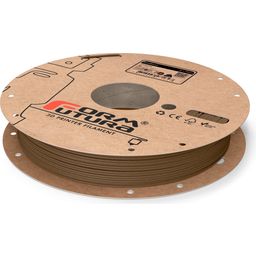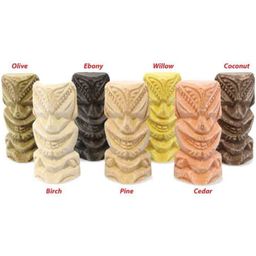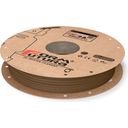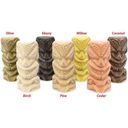Formfutura EasyWood™ Coconut, 1.75 mm / 500 g
Coconut wood filament for 3D Printers
€ 27,49
(€ 54,98 / kg, All prices excl. VAT. - Excludes delivery costs)
Features & Advantages
- Genuine wood finish
- Woody scent
- Easy to print
- Almost no distortion
Item no.: FF-EWOD-175COCO-00500, Content: 500 g, EAN: 8718924471647
Product information & technical details
- Item no.: FF-EWOD-175COCO-00500
- Manufacturer No.: EWOD-175COCO-00500
- Manufacturer: Formfutura
- Content: 500 g
- Diameter: 1,75 mm, 2,85 mm
- Product type: Wood Filaments
- Filament colour: Wood
- RAL colour: RAL 8016
- System: Spool
- Net weight: 250 g, 500 g, 2300 g, 4500 g, 5000 g
- Recommended processing temperature: 210 - 230 °C
- Recommended heating temperature: 0 - 60 °C
- Diameter related tolerance : ± 0,05 mm
Description
EasyWOOD ™ looks, feels and smells like real wood. Easy Wood ™ is a unique blend of 40% ground wood particles in combination with the proven EasyFil ™ polymers.
This material is exceptionally easy to print.
Due to its low shrinkage, EasyWOOD ™ is nearly distortion-free and hardly warps when cooled.
Therefore, EasyWOOD ™ is printed without a heating board. If the printer is equipped with a heating board, we recommend setting the temperature between 35-60 °C.
EasyWOOD ™ prints best at temperatures ranging between 200-240 °C.
A beautiful wooden structure can be achieved with EasyWOOD ™ after printing. A fine sandpaper boasts amazing results.
Using sandpaper for the finishing touches works best on rough EasyWOOD ™.
Filament spool dimensions
Questions & Answers about Formfutura EasyWood™ Coconut
-
Which nozzle size should I use for this? Does it need to be a steel nozzle?
Customer Reviews
3 English reviews written for Formfutura EasyWood™ Coconut
11 customer reviews in all languages
| 5 stars | | 10 | (45%) |
|---|---|---|---|
| 4 stars | | 3 | (13%) |
| 3 stars | | 4 | (18%) |
| 2 stars | | 1 | (4%) |
| 1 Stars | | 4 | (18%) |
22 reviews
3 customer reviews in English
11 customer reviews in all languages
-
Decent filament
Rated with 4 out of 5 stars.
First wood filament I've used and now after sitting down to get the settings dialed in, it's printing well.
I will say it's been a bit of a pain to get it dialed in but that doesn't seem to be just this wood filament as most wood ones I've seen people have said they're always that way
Anyways, in case a Prusa i3 mk3s user gets this here's the settings I used to get it dialed pretty decently
Nozzle: 0.4
PrusaSlicer Settings:
Filament Settings:
Temp:
-Extruder - First Layer:215 : Other layers:215
Printer Settings:
Retraction:
-Length: 7.5mm
-Retraction Speed: 70mm.
This made the amount of stringing I experienced very minimal. You can probably go down to 7mm on Retraction Length, and maybe 60-65mm on Speed.Was this rating helpful? (5) (0)
-
Wrecked my nozzle on the first layer!
Rated with 1 out of 5 stars.
I couldn't even print a single layer with this filament before it irrevocably bunged up my nozzle.
I was using a 0.4mm nozzle, and the recommended temperature settings. The print started fine, but when I cam back five minutes later my print bed was covered in brown tar and nothing was printing. After spending half an hour trying to clean the nozzle, I cam to the conclusion that it's junked.
Terrible stuff. :(Was this rating helpful? (0) (0)
-
Too soft and fragile
Rated with 2 out of 5 stars.
This filament is so soft that my CR-X, on its softest setting, crushes the filament into a flattened shape that eventually binds in the tube, until the filament just can't feed and gets chewed up.
It's taken a while of messing with settings to get to the bottom of what was happening here. If I'm lucky I can do one small 17 min print before the tubes needs pulling off and clearing out.
I have never had so much trouble with a filament before!
It's very fragile too. Easy to snap when handling. Won't be buying a wood filament again, that's for sure...Was this rating helpful? (2) (0)





The 0.4 mm nozzle should be compatible with any Woodfill filament. Some people recommend that the nozzle should be at least 0.4 mm as the filament may clog a smaller nozzle, but 0.4 should be ok. The size of the nozzle is most important for how detailed you wish your model to be.
With regards to the nozzle material, the standard brass nozzle may wear over time and may have enough friction to clog the nozzle. Low friction nozzles are best due to this. Woodfill is not as abrasive as some filaments so a ruby nozzle while performing well is not entirely necessary but a low cost low friction nozzle is advised and will be sufficient.
It is also a good idea to use specific nozzle types for specific filaments due to cross-contamination issues so that proper maintenance can be delivered.